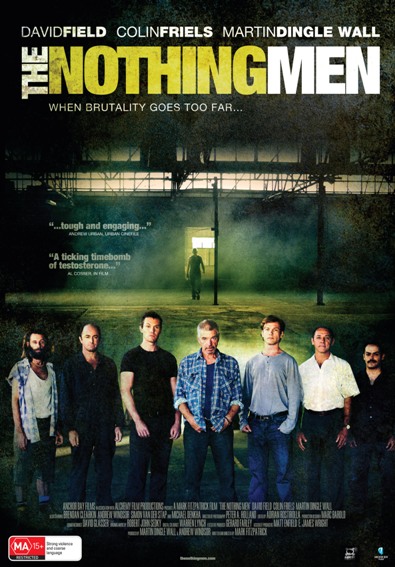
THE NOTHING MEN
Australia, 2008, 85 minutes. Colour.
David Field, Colin Friels, Martin Dingle- Wall, Brendan Clearkin, Michael Denkha, Mark Fitzpatrick, Amelia Beau- Kaldor.
Directed by Mark Fitzpatrick.
The Nothing Men is about ordinary workers at a factory. It opens with the factory in full progress, later showing it to be empty as redundancies are enforced. A group of men, the Nothing Men, sit out the months idly in the empty factory until their redundancy pay comes through. They banter, talk about sex, talk about the workplace, are suspicious of spies. Colin Friels plays the leader of the group. David Field, in an unusually sympathetic role, plays an ordinary man whom the other man think is a spy. However, while he boasts about the achievements of his son, the truth is far different, his having been turned into a vegetative state by a hit-run accident.
The film seems as if it was based on a play. There is a great emphasis on dialogue and conversation. The film reveals the characters of the men, making them quite distinctive, while focusing on them as a group. Martin Dingle -Wall stands out as a loner who befriends the newcomer, plays chess with him – and then discovers the newcomer’s secret and his own involvement in it.
The film shows the ugly Australian at his worst, sneering, boastful, low tone, cruel. The group is particularly cruel towards the newcomer when they discover the truth about his son.
This leads to an unexpectedly violent conclusion – what the audience might have been feeling about the group and what could be done to them, but taken aback when it actually does.
1. The labour situation? Human issues? The Australian perspective and tone?
2. The opening, the factory, everyone hard at work, their skills and expertise? The transition to the factory as empty? Everything on hold? The factory and the layout of where the men met, going outside for the lunch van, the streets, David’s home, the exteriors and interiors? Musical score?
3. A dialogue film, opening out in the camera and the action going outside the warehouse?
4. The title, with reference to the workers, their losing their jobs, their moral values and standing?
5. The introduction, the work, the change, the workers and their skills, the bosses and their discussions, the background of the downsizing? The other factories?
6. Downsizing, the bosses and their attitudes, the conditions for payment, the redundancies, people reporting to the bosses?
7. The men and their situation, stuck, sitting around, thinking people were spying, their behaviour, their idle behaviour, their talk, slinging off at each other, the lunch break and Louise coming with the lunches, their talking and flirting?
8. The personality of the group, led by Jack, his strong personality, the taunts about Vince and his manhood, the man on drugs, Wesley and his story, Des and his siding with Jack, the stories about his wife? The other men? The ordinary appearances of the men, their language, stances, interactions?
9. David, his being sent by the head office, the group’s assumptions about him, taunting him, his phone calls and their misinterpreting them, his telling the story about his son, exaggerating his qualities? The story of his wife? At home, Maggie as the helper, the details of her looking after the son and his helplessness? The truth and David not facing up to it? Audience response when discovering the truth? The men spying, discovering the truth, the reaction of mockery? Wesley and his friendship with David, playing chess, going to the house, helping him – and the discovery of the truth?
10. Jack as leader, bully, Des as his ally? The others and their ordinariness? The drug man? Having to be on their best behaviour so that they would not lose their redundancies? The phone calls, the joy when their redundancy pay was through?
11. Wesley, his worries, taking the pills, discovering the truth about David, being at hi house, telling him the truth that he was responsible for the hit-run? The pathos of David’s telling the story?
12. The bosses, the money, money becoming available?
13. David and the pressure, his being hurt, getting his gun?
14. Audiences surprised at the final confrontation? David, his obsession, the violence, the close-ups of his shooting the men? The men and the way that they died, Jack and his defiance?
15. A sobering experience, melodramatic – and its strong message?